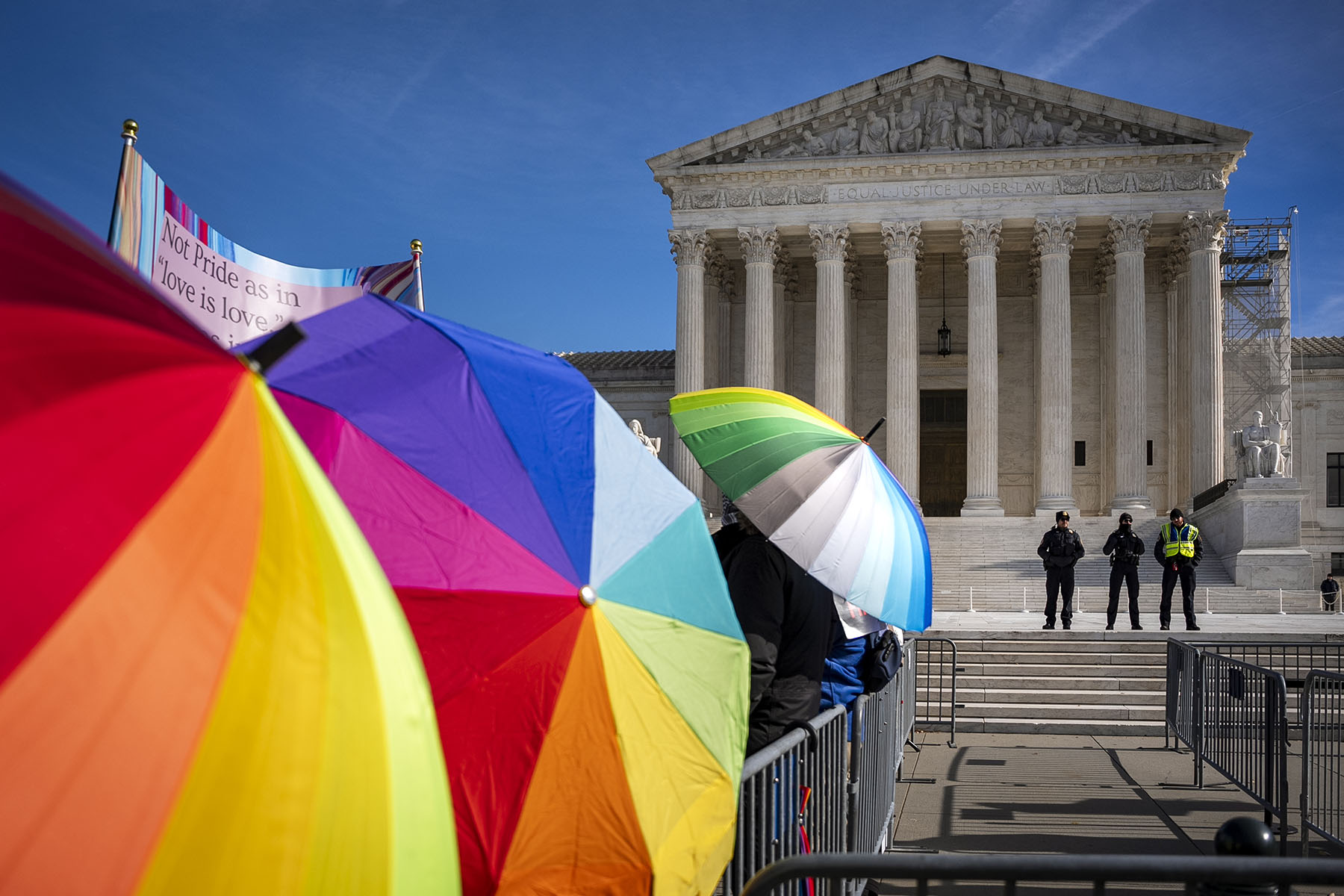The Supreme Court’s 6-3 decision to uphold a Tennessee law banning gender-affirming care for transgender youth dealt a painful blow to families of trans kids — but the fight is not over. LGBTQ+ rights attorneys say that even as the Trump administration makes it harder for trans Americans to live without fear of discrimination, there are still openings — some left by the court ruling itself — to fight gender-affirming care bans and other anti-trans laws.
The court ruling is narrow enough that it provides a road map to new strategies. The justices determined that Tennessee’s law does not discriminate against transgender minors. However, in delivering this loss to LGBTQ+ advocates, the ruling did not address whether a law meant to be discriminatory against trans people is constitutional — a determination that could have significantly set back transgender rights as a whole.
“That would have been absolutely devastating,” said Shannon Minter, legal director of the National Center for LGBTQ Rights. “They very carefully did not do that.”
The ruling leaves open another legal strategy: fighting gender-affirming care bans on the grounds that they violate a parent’s right to make medical decisions for their trans child. This argument was removed from the case once the Biden administration got involved because its appeal to the Supreme Court focused on whether gender-affirming care bans discriminate based on sex. Parents of trans youth can still challenge these bans by asserting their due process rights under the 14th Amendment, a question that has not yet come before the justices.
“Parental rights is this very old right recognized for a long time in the Supreme Court’s jurisprudence. It emerges from ideas about limited government, sanctity of the family, so it has broad appeal,” said Kevin Barry, associate dean and law professor at Quinnipiac University School of Law.
Appellate courts in the 11th Circuit and 6th Circuit, which cover some southern and Midwestern states, have both rejected it, though. As a result, any further challenges must come from states outside of these courts’ jurisdictions.
“We continue to litigate under every theory that we have,” Chase Strangio, co-director of the American Civil Liberties Union’s LGBTQ & HIV Project, told reporters during a press call last week. Strangio represented the ACLU during oral arguments for the case in December, alongside former Solicitor General Elizabeth Prelogar. “This is a setback in many ways, but we continue onward in the fight.”
-
In Case You Missed It:
-
In Case You Missed It: Supreme Court rules to keep Tennessee’s gender-affirming care ban in place
The Supreme Court’s decision still hinders lawyers’ ability to fight state bans in the future, because most of these laws have been challenged on the grounds of the 14th Amendment’s equal protection clause, which was at the core of this case. The Supreme Court found that Tennessee’s law does not violate the equal protection clause because it is not sex discrimination. Now, lawyers fighting these health care bans are weighing their next steps and which arguments can carry the fight forward.
Half the country has bans like Tennessee’s in place. According to the Williams Institute at the UCLA School of Law, at least 112,400 transgender youth from the ages of 13 to 17 live in states that have banned or restricted their access to gender-affirming care.
The Supreme Court, however, has left LGBTQ+ rights attorneys with plenty of tools to fight health care bans and other discriminatory laws that target transgender people. One of the key arguments is bias — and there is an existing road map. In Florida last year, a federal district court held that the state’s gender-affirming care restrictions for adults and minors were based on animus, or hostility toward transgender people.
Minter said there was an abundance of evidence for attorneys to bring in that case, including negative statements by legislators and the state’s misleading informed consent forms for patients that stated only the risks of gender-affirming care.
“If we can show these laws are based on animus against transgender people, that door is also still open,” said Minter. “Skrmetti affirmed that if you could show that one of these laws was based on animus, then it would be unconstitutional.”
Attorneys have already argued in federal court that the Trump administration’s policies cracking down on transgender people are rooted in animosity and that the sentiment was a cornerstone of the presidential campaign. Federal judges have agreed.
-
Previous Coverage:
Last week’s Supreme Court decision applies to gender-affirming care for minors, and not adults, a relevant guardrail at a time when Congress and the Trump administration have proposed policies to make this health care harder to access for both groups. It is, however, affecting trans people on the ground right now — and not just in Tennessee, where trans minors have been barred from accessing gender-affirming care for over a year. In neighboring Kentucky, where gender-affirming care for trans minors is also banned, some families had been waiting to decide their next move until the court released its opinion in U.S. v. Skrmetti.
“There were those families who were holding out, thinking the Supreme Court would make the right decision, so they are now scrambling to get their kids care,” said Oliver Hall, trans health director at the Kentucky Health Justice Network (KHJN).
Through his organization, Hall works directly with trans adults and families of trans youth to find gender-affirming care for them in other states. The amount of help that Kentucky’s trans community needs has only continued to grow, they said. At this point, almost the entire South has banned or restricted gender-affirming care for trans youth, which comprises of puberty blockers for prepubescent kids and hormone replacement therapy for trans teens. Surgeries are rare for minors. Hall works with patients to find gender-affirming care for them in other states, like Pennsylvania or Illinois.
As these bans have spread, and as gender-affirming care has become more politicized, the unusual nature of these laws has also largely gone unnoticed, said Barry, a constitutional law scholar and expert in disability and trans rights.
“States just aren’t in the business of banning medical care categorically. It’s highly, highly unusual,” he said. “States don’t typically do this.”
But that’s what the Supreme Court did in U.S. v. Skrmetti: It allowed Tennessee’s gender-affirming care ban to stay in place, while leaving any policy discussions about the importance or efficacy of the care to individual states. Still, the ruling leaves some open doors.
One such door — “a tiny sliver of hope,” as Minter described it — can be found in a footnote in Justice Amy Coney Barrett’s concurring opinion. She wrote that transgender people are not a suspect class — meaning they should not receive extra protections against discrimination under the Constitution. However, she takes no position on whether there is a longstanding history of government discrimination against trans people because that topic wasn’t briefed in this case.
To Minter, laying out this history is one strategy that attorneys working for LGBTQ+ rights need to prioritize.
“It just shows that we have to do a better job of educating courts and the public,” he said. “We think people understand more than they do.”
-
Previous Coverage:
The court’s decision also did not address whether Bostock v. Clayton County, the Supreme Court case that found LGBTQ+ people are protected against workplace discrimination, reaches beyond Title VII into areas like health care.
Since the justices did not limit Bostock to employment protections, as Tennessee argued that it should, LGBTQ+ rights attorneys have another opportunity, said Karen Lowey, director of constitutional law at Lambda Legal.
“Those paths are still really viable for recognizing the denials of health care to trans people are still statutory forms of sex discrimination,” she said.
Another path to challenge state gender-affirming care bans could lie within federal disability rights law. People with gender dysphoria are protected under the Americans with Disabilities Act (ADA), following a 2022 federal appeals court ruling that the Supreme Court allowed to take hold in 2023. And in U.S. v. Skrmetti, the justices state that Tennessee’s law does not exclude anyone from medical treatments based on being transgender, but on being diagnosed with gender dysphoria.
Some lawyers see an opportunity here, although not all legal experts agree that it is a viable option. Disability discrimination is still subject to a lower level of legal scrutiny known as rational basis, and not the heightened scrutiny that LGBTQ+ rights attorneys asked the Supreme Court to apply to Tennessee’s law. The government is more likely to win a case when rational basis is involved. However, Barry said, “we also know that sometimes the court is willing, under rational basis, to invalidate government action because it’s based on a bare desire to harm.”
In other words, if attorneys can prove that anti-trans laws are based on animus, more doors could open.
Several LGBTQ+ advocacy groups did notice that, within the court’s majority ruling, the justices referred to transgender people with appropriate nouns and pronouns, which the state of Tennessee had refused to do throughout the case. At a time when the sitting president has essentially declared that trans people do not exist, some advocates see this as an encouraging sign of respect from the court for transgender people.








